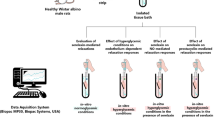Abstract
Nitric oxide (NO) as a mediator in smooth muscle cells causes rapid and robust increases in cGMP levels. The cGMP-dependent protein kinase I has emerged as an important signal transduction mediator for smooth muscle relaxation. The purpose of this study was to examine the existence and distribution of two key enzymes of the NO/cGMP pathway, the cGMP-dependent kinase I (cGK I) and the soluble guanylate cyclase (sGC) in human cavernosal tissue.
The expression of the enzymes were examined in corpus cavernosum specimens of 23 patients. Eleven potent patients suffered from penile deviations and were treated via Nesbit’s surgical method. Nine long-term impotent patients underwent implantation of flexible hydraulic prothesis. Three potent patients underwent trans-sexual operations. Expression of the sGC and cGK I were examined immunohistochemically using specific antibodies.
In all specimens of cavernosal tissue a distinct immunoreactivity was observed in different parts and structures. We found a high expression of sGC and cGK I in smooth muscle cells of vessels and in the fibromuscular stroma. The endothelium of the cavernosal sinus, of the cavernosal arteries, and the cavernosal nerve fibers showed an immunoreactivity against sGC. The distribution analysis of cGK I revealed a predominately vesicular localization in smooth muscle cells. The examination of the endothelium showed no clear immunoreactivity against cGK I. There was no distinct difference in immunoreactivity and cellular distribution between potent and impotent patients.
cGMP-dependent kinase I is predominately expressed in cavernosal smooth muscle cells. sGC is expressed in smooth muscle cells, endothelium and nerve fibers of the corpus cavernosum. In this study, there is no correlation between the distribution of soluble guanylate cyclase and cGMP dependent kinase I in potent or impotent patients.
This is a preview of subscription content, access via your institution
Access options
Subscribe to this journal
Receive 8 print issues and online access
$259.00 per year
only $32.38 per issue
Buy this article
- Purchase on Springer Link
- Instant access to full article PDF
Prices may be subject to local taxes which are calculated during checkout
Similar content being viewed by others
Author information
Authors and Affiliations
Rights and permissions
About this article
Cite this article
Klotz, T., Bloch, W., Zimmermann, J. et al. Soluble guanylate cyclase and cGMP-dependent protein kinase I expression in the human corpus cavernosum. Int J Impot Res 12, 157–164 (2000). https://doi.org/10.1038/sj.ijir.3900524
Received:
Revised:
Accepted:
Published:
Issue Date:
DOI: https://doi.org/10.1038/sj.ijir.3900524
Keywords
This article is cited by
-
Stimulators and activators of soluble guanylate cyclase for urogenital disorders
Nature Reviews Urology (2018)
-
Protein kinase enzymes in the human vagina—relation to key mediators of the cyclic AMP and cyclic GMP pathways
International Journal of Impotence Research (2017)
-
Additive effects of Artemisia capillaris extract and scopoletin on the relaxation of penile corpus cavernosum smooth muscle
International Journal of Impotence Research (2015)
-
Sexuelle Dysfunktion bei Harninkontinenz
Der Urologe (2007)
-
Activation of soluble guanylate cyclase causes relaxation of corpus cavernosum tissue: synergism of nitric oxide and YC-1
International Journal of Impotence Research (2002)



